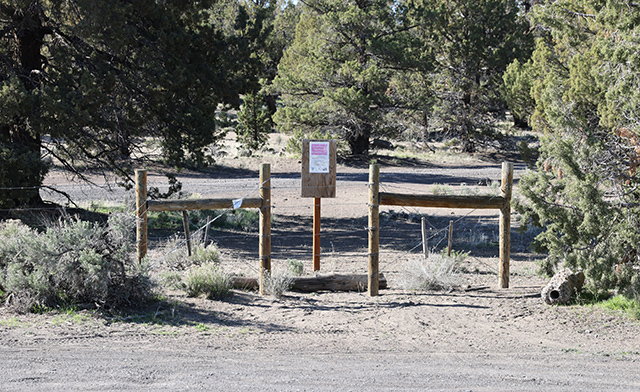Deschutes County blocks tribal treaty rights evidence in Thornburgh resort appeal
Published 10:11 am Thursday, April 17, 2025

- Signs and fencing located on the southern portion of the Thornburgh property near Tumalo. (Dean Guernsey/The Bulletin)
In the next ruling amid a 20-year tangle over the Thornburgh destination resort, the Deschutes County Commission will decide whether the massive resort’s plan for water consumption infringes on the rights of tribes to harvest fish from traditional rivers preserved in an 1855 treaty with the federal government.
But the Confederated Tribes of Warm Springs — a main challenger to the resort, located between Tumalo and Redmond — won’t be allowed to present any more evidence on their own treaty fishing rights after commissioners voted 2-1 to close the public record on that issue.
Tribal leaders called Wednesday’s decision a major blow to the relationship between Deschutes County and the Confederated Tribes of Warm Springs.
Trending
The resort’s amended plan for fish and wildlife mitigation — which eliminated one of three planned golf courses and reduced water usage by 35% — was approved by Deschutes County in 2023. After several appeals by the tribes and others, courts sent the decision back to the county for more explanation on three topics: how the plans meet state standards for “no net loss” to fish habitat, the resort’s economic analysis and whether the plans violate the fishing treaty.
The county commission will receive new testimony only for the economic analysis issue, not the two others, heeding the request of Thornburgh developers.
“It’s a shame we’re seeing an applicant getting bounced around the appeal process for 20 years,” said Commissioner Tony DeBone, who voted to exclude further public testimony on the treaty issue. “I worry this is kind of that moving the goalpost scenario. Yes there’s more to analyze, yes, there’s more we could debate here, but a decision needs to be made at some point.”
Commissioner Patti Adair joined DeBone, outvoting commissioner Phil Chang.
“I do believe I have like seven binders on Thornburgh. At least seven,” Adair said. “So I’m happy with that.”
Right to fish
The tribes’ Thornburgh challenge has become a proxy for a broader question about the interplay between federal treaties with tribes and the land use decisions of local governments.
Trending
Jonathan Smith Sr., chairman of the Warm Springs Tribal Council, sent an April 10 letter to the county requesting the chance to submit more evidence on treaty rights, and to move the public hearing date to June, citing a conflict with tribal council business. Smith emphasized a directive from higher courts to give the tribes a chance to provide “indigenous expertise and knowledge for the board’s consideration that the Tribe asserts it did not have adequate time to present due to its late involvement in the proceedings.”
In the 1855 treaty, tribes ceded 10 million acres in Central Oregon — including the land where Thornburgh is slated — in exchange for preserved rights to hunt and fish in “usual and accustomed” places. Courts have determined the treaty rights extend to a state requirement to make sure there are enough fish to catch.
The treaty was an agreement between the tribes and the federal government, not the county. But the U.S. Constitution holds treaties as the “supreme law of the land.”
Because Thornburgh lies within the Deschutes River Basin, the resort — and the county’s land use decision — is directly linked with the right to fish, the Confederated Tribes of Warm Springs argue.
“Our Tribal knowledge — both scientific and cultural — is essential to deliver a healthy fishery for our people,” Smith said in a press release Wednesday. “The county simply cannot understand the full picture of this project’s impact without our perspective.”
History of appeals
The 2,400-acre development, located in the Cline Butte area west of Redmond, is slated to include at least 950 single-family homes, private lakes and hiking trails, two golf courses, sports facilities and a luxury hotel.
Thornburgh submitted its final master plan to the county in 2007. It was approved after years of litigation in 2018.
The resort’s required management plan for fish and wildlife was approved in 2008. In an attempt to reduce impacts, the resort revised the plan in 2022, scaling development and reducing water use from 2,129 acre-feet per year to 1,460 acre-feet per year.
An acre-foot is the volume of water needed to cover 1 acre of land with a foot of water, or about 326,000 gallons.
The county approved Thornburgh’s amended plan in 2023. Several groups appealed, including the Warm Springs tribes, which argued the county’s decision didn’t devote enough attention to the tribes’ evidence about indigenous knowledge, and had used “implicit cultural bias.”
The state Land Use Board of Appeals shot down the challenge, stating the tribe didn’t raise the treaty rights issue to the county early enough. The Oregon Court of Appeals flipped that decision when the tribe appealed again. The land use board then passed the decision back to the county in February.
All of those address procedural issues. Local and state bodies have yet to weigh in on whether Thornburgh’s water pumping would hurt fisheries to the extent it would violate the treaty.
“We just basically ignored considerations of tribal treaty rights during those deliberations,” said Chang, who has mostly voted against Thornburgh’s applications. He voted to open the record to hear the tribes’ evidence.
Even though a majority of the county commission barred new public testimony on the treaty issue, the board will still have to make a final decision on the matter.
A ticking clock
Thornburgh developer Kameron DeLashmutt argues there isn’t much more to consider. He said allowing more public testimony on the fish issues would mean relitigating what’s already been decided.
In two recent letters to commissioners, DeLashmutt made the case that previous oral arguments have laid the framework for the county to approve plans in a way that would be sufficient for higher courts. Land use authorities have already determined his water plans meet standards for minimizing harm to fish, and therefore implied that the resort wouldn’t affect the tribes’ ability to fish. The county simply needs to make that explicit, he said.
As Thornburgh — the most litigated land use application in Deschutes County history — drags on, commissioners are under growing pressure to make a decision. State law gives counties a 120-day clock for remand hearings like the current case.
Delaying the public hearing at the tribes’ request could put that at risk, county officials said.
DeLashmutt argues the tribes have had more than enough time since he submitted the water plans in 2022 to make arguments about treaty rights. He said Thornburgh has been willing to work with the tribes on their concerns, and previously agreed to allow more time for the tribes to gather evidence.
But time has been used to “incessantly delay” Thornburgh, DeLashmutt said in an April 11 letter to the county commission. He called the Thornburgh battle a “stain on the State of Oregon and certainly a blemish on Deschutes County.”
“What has happened to Thornburgh over the last 21 years is a complete abuse of the land use system,” he wrote.









